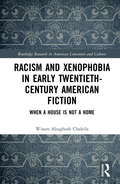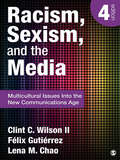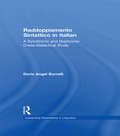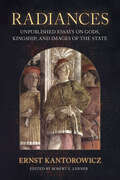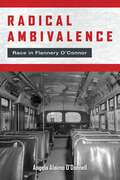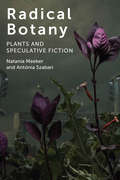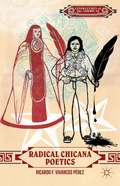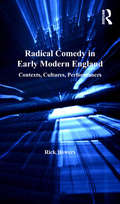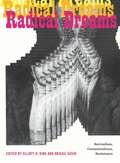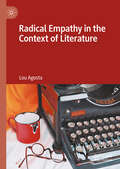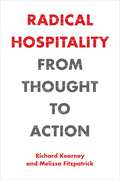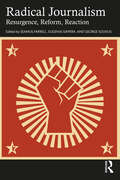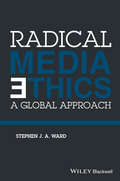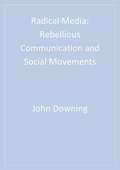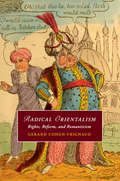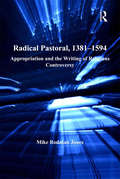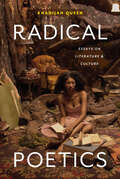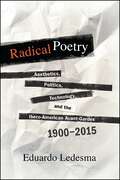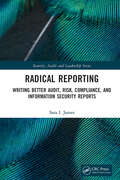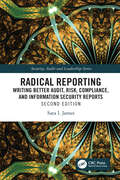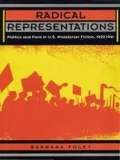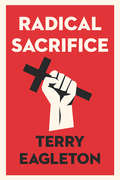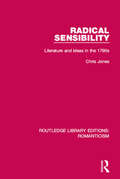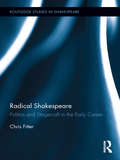- Table View
- List View
Racism and Xenophobia in Early Twentieth-Century American Fiction: When a House is Not a Home (Routledge Research in American Literature and Culture)
by Wisam Abughosh Chaleila"The Melting Pot," "The Land of The Free," "The Land of Opportunity." These tropes or nicknames apparently reflect the freedom and open-armed welcome that the United States of America offers. However, the chronicles of history do not complement that image. These historical happenings have not often been brought into the focus of Modernist literary criticism, though their existence in the record is clear. This book aims to discuss these chronicles, displaying in great detail the underpinnings and subtle references of racism and xenophobia embedded so deeply in both fictional and real personas, whether they are characters, writers, legislators, or the common people. In the main chapters, literary works are dissected so as to underline the intolerance hidden behind words of righteousness and blind trust, as if such is the norm. Though history is taught, it is not so thoroughly examined. To our misfortune, we naively think that bigoted ideas are not a thing we could become afflicted with. They are antiques from the past – yet they possessed many hundreds of people and they surround us still. Since we’ve experienced very little change, it seems discipline is necessary to truly attempt to be rid of these ideas.
Racism, Sexism, and the Media: Multicultural Issues Into the New Communications Age
by Felix Gutierrez Lena M. Chao Clint C. WilsonAs our society becomes increasingly diverse, racial, ethnic, and gender inclusiveness and equality have taken on new life in the United States. The Fourth Edition of Racism, Sexism, and the Media examines how different race, ethnic, and gender groups fit into the fabric of America; how the media influence and shape everyone′s perception of how they fit; and how the media and advertisers are continuously adapting their communications to effectively reach these groups. The authors explore how the rise of class/group-focused communication, resulting from the convergence of new media technologies and continued demographic segmentation of audiences, has led media outlets and advertisers to see women and people of color as influential key audiences and target markets, as well as a source of stereotypes, which may lead to media insensitivity and may help perpetuate social inequity. The Fourth Edition includes updated content on topics covered in the previous editions, such as film, television, radio, print media, advertising, and public relations. It also incorporates new material on: women of color, including an integrated assessment of their media experiences; new material on Muslim, Arab, and Asian groups; new technologies; and social media use and their impact. Presented in a logical, easy-to-follow format, this text offers readers an enhanced and expanded understanding of how women and minorities in the United States shape and are shaped by today′s media environment.
Raddoppiamento Sintattico in Italian: A Synchronic and Diachronic Cross-Dialectical Study (Outstanding Dissertations in Linguistics)
by Doris Angel BorrelliFirst Published in 2002. Routledge is an imprint of Taylor & Francis, an informa company.
Radiances: Unpublished Essays on Gods, Kingship, and Images of the State (Medieval Societies, Religions, and Cultures)
by Ernst KantorowiczRadiances gathers previously unpublished essays by one of the greatest historians of the twentieth century. Although best known for The King's Two Bodies (1957), Ernst Kantorowicz's scholarly expertise ranged from classical antiquity to early modernity and from political pageantry to numismatics. These essays traverse the breadth of his expertise, exploring "radiations" of the themes that were central to his published work: sovereignty, theology, law, and iconography. The radiations in these engaging essays include the imagery of throne-sharing from the Hellenistic era and Pharaonic Egypt to early Christianity, coronation ceremonies in Byzantium and the West, the Carolingian and Burgundian Renaissances, the relationship between Rome and Christianity, the importance of history as a humanistic pursuit, and the significance of postage stamps in political myth-building. Robert E. Lerner discusses each essay's composition, themes, and place in Kantorowicz's oeuvre. Combining vast knowledge with intellectual delight, Radiances teems with the profound historical insights that distinguished Kantorowicz's scholarship.
Radical Ambivalence: Race in Flannery O'Connor (Studies in the Catholic Imagination: The Flannery O'Connor Trust Series)
by Angela Alaimo O'DonnellRadical Ambivalence is the first book-length study of Flannery O’Connor’s attitude toward race in her fiction and correspondence. It is also the first study to include controversial material from unpublished letters that reveals the complex and troubling nature of O’Connor’s thoughts on the subject. O’Connor lived and did most of her writing in her native Georgia during the tumultuous years of the civil rights movement. In one of her letters, O’Connor frankly expresses her double-mindedness regarding the social and political upheaval taking place in the United States with regard to race: “I hope that to be of two minds about some things is not to be neutral.” Radical Ambivalence explores this double-mindedness and how it manifests itself in O’Connor’s fiction.
Radical Botany: Plants and Speculative Fiction
by Natania Meeker Antónia SzabariRadical Botany excavates a tradition in which plants participate in the effort to imagine new worlds and envision new futures. Modernity, the book claims, is defined by the idea of all life as vegetal. Meeker and Szabari argue that the recognition of plants’ liveliness and animation, as a result of scientific discoveries from the seventeenth century to today, has mobilized speculative creation in fiction, cinema, and art. Plants complement and challenge notions of human life. Radical Botany traces the implications of the speculative mobilization of plants for feminism, queer studies, and posthumanist thought. If, as Michael Foucault has argued, the notion of the human was born at a particular historical moment and is now nearing its end, Radical Botany reveals that this origin and endpoint are deeply informed by vegetality as a form of pre- and posthuman subjectivity. The trajectory of speculative fiction which this book traces offers insights into the human relationship to animate matter and the technological mediations through which we enter into contact with the material world. Plants profoundly shape human experience, from early modern absolutist societies to late capitalism’s manipulations of life and the onset of climate change and attendant mass extinction.A major intervention in critical plant studies, Radical Botany reveals the centuries-long history by which science and the arts have combined to posit plants as the model for all animate life and thereby envision a different future for the cosmos.
Radical Chicana Poetics (Literatures of the Americas)
by Ricardo F. Vivancos PérezIn This Bridge Called My Back, Gloria Anzaldúa wrote: "A woman who writes has power. A woman who writes is feared. In the eyes of the world this makes us dangerous beasts." Her statement marked a moment of collective self-recognition. Radical Chicana Poetics considers this moment as a point of entry into Chicana writings. By offering a comparative analysis of works by Anzaldúa, Cherríe Moraga, Ana Castillo, Emma Pérez, Alicia Gaspar de Alba, and Sandra Cisneros, this book elucidates the subtle differences among them in relation to contemporary cultural production and feminist activism. Additionally, this book addresses questions of positionality and ethics for the Chicana studies scholar.
Radical Comedy in Early Modern England: Contexts, Cultures, Performances (Studies In Performance And Early Modern Drama Ser.)
by Rick BowersDrawing on the generic and mythic strength of comedy and the theories of Bakhtin, Bergson, and Hobbes, this book identifies the radical nature of early modern English comedy. The satirical comedic actions that shape the "Shepherds' Play," Thomas Dekker's pamphlets, and the comic dramas of Marston, Middleton, and Jonson are all driven, Bowers points out, by an ability to criticize authority, assert plebeian culture, and insist on the complexity and innovation of human discourse. The texts examined (including The Jew of Malta, Metamorphosis of Ajax, Antonio and Mellida, Bartholomew Fair, The Alchemist, and A Chaste Maid in Cheapside) simultaneously create and employ standard comedic elements. Farce, absurdity, excess, over-the-top characters, unremitting irony, black humor, toilet humor, and tricksters of all types - such features and more combine to satirize medical, religious, and political authority and to implement necessary social change. Written with a narrative ease, Radical Comedy in Early Modern England shows how comic interventions both describe and reconfigure prevalent authority in its own time while arguing that, through early modern comedy, one can observe the changes in social behavior and understandings characteristic of the Renaissance.
Radical Dreams: Surrealism, Counterculture, Resistance (Refiguring Modernism #35)
by Elliott H. King and Abigail SusikSurrealism is widely thought of as an artistic movement that flourished in Europe between the two world wars. However, during the 1960s, ’70s, and ’80s, diverse radical affinity groups, underground subcultures, and student protest movements proclaimed their connections to surrealism. Radical Dreams argues that surrealism was more than an avant-garde art movement; it was a living current of anti-authoritarian resistance.Featuring perspectives from scholars across the humanities and, distinctively, from contemporary surrealist practitioners, this volume examines surrealism’s role in postwar oppositional cultures. It demonstrates how surrealism’s committed engagement extends beyond the parameters of an artistic style or historical period, with chapters devoted to Afrosurrealism, Ted Joans, punk, the Situationist International, the student protests of May ’68, and other topics. Privileging interdisciplinary, transhistorical, and material culture approaches, contributors address surrealism’s interaction with New Left politics, protest movements, the sexual revolution, psychedelia, and other subcultural trends around the globe. A revelatory work, Radical Dreams definitively shows that the surrealist movement was synonymous with cultural and political radicalism. It will be especially valuable to those interested in the avant-garde, contemporary art, and radical social movements.In addition to the editors, the contributors to this volume include Mikkel Bolt Rasmussen, Jonathan P. Eburne, David Hopkins, Claire Howard, Michael Löwy, Alyce Mahon, Gavin Parkinson, Grégory Pierrot, Penelope Rosemont, Ron Sakolsky, Marie Arleth Skov, Ryan Standfest, and Sandra Zalman.
Radical Dreams: Surrealism, Counterculture, Resistance (Refiguring Modernism)
by Elliott H. King and Abigail SusikSurrealism is widely thought of as an artistic movement that flourished in Europe between the two world wars. However, during the 1960s, ’70s, and ’80s, diverse radical affinity groups, underground subcultures, and student protest movements proclaimed their connections to surrealism. Radical Dreams argues that surrealism was more than an avant-garde art movement; it was a living current of anti-authoritarian resistance.Featuring perspectives from scholars across the humanities and, distinctively, from contemporary surrealist practitioners, this volume examines surrealism’s role in postwar oppositional cultures. It demonstrates how surrealism’s committed engagement extends beyond the parameters of an artistic style or historical period, with chapters devoted to Afrosurrealism, Ted Joans, punk, the Situationist International, the student protests of May ’68, and other topics. Privileging interdisciplinary, transhistorical, and material culture approaches, contributors address surrealism’s interaction with New Left politics, protest movements, the sexual revolution, psychedelia, and other subcultural trends around the globe. A revelatory work, Radical Dreams definitively shows that the surrealist movement was synonymous with cultural and political radicalism. It will be especially valuable to those interested in the avant-garde, contemporary art, and radical social movements.In addition to the editors, the contributors to this volume include Mikkel Bolt Rasmussen, Jonathan P. Eburne, David Hopkins, Claire Howard, Michael Löwy, Alyce Mahon, Gavin Parkinson, Grégory Pierrot, Penelope Rosemont, Ron Sakolsky, Marie Arleth Skov, Ryan Standfest, and Sandra Zalman.
Radical Empathy in the Context of Literature
by Lou AgostaIn this book, Lou Agosta explains, using literary examples, that readers require radical empathy to relate to, process, and overcome bad things happening to good people (for example: moral and physical trauma, double binds, soul murder, and behavior in extreme situations.) A definition of radical empathy in the context of literature emerges: Empathic distress occurs, but one’s commitment to the Other is such that one empathizes in the face of empathic distress. One’s empathic commitment to the survivor enables the survivor to recover her/his humanness, integrity, and relatedness. This work engages how the impact and cost of empathic distress affect the different aspects of empathic receptivity, empathic understanding, empathic interpretation, and empathic responsiveness, delivering a breakthrough and transformation in relating to the Other. The intersection of literature and empathy is the place in which the literary artwork transfigures the face of trauma, overcoming empathic distress, and allowing radical empathy to enable the fragmented Other to recover her/his integrity. Additionally, the book does not merely tell the reader about radical empathy in the context of the literary art work; it delivers an experience of radical empathy in context in empathy’s receptivity, understanding, interpretation and responsiveness.
Radical Hospitality: From Thought to Action (Perspectives in Continental Philosophy)
by Richard Kearney Melissa FitzpatrickRadical Hospitality addresses a timely and challenging subject for contemporary philosophy: the ethical responsibility of opening borders, psychic and physical, to the stranger. Kearney and Fitzpatrick show how radical hospitality happens by opening oneself in narrative exchange to someone or something other than ourselves—by crossing borders, whether literal or figurative. Against the fears, dogmas, and demands for certainty and security that push us toward hostility, we also desire to wager with the unknown, leap into the unanticipated, and celebrate the new, a desire this book seeks to recognize and cultivate. The book contends that hospitality means chancing one’s hand, one’s arm, one’s very self, thereby opening a vital space for new voices to be heard, shedding old skins, and welcoming new understandings.Radical Hospitality engages with urgent moral conversations concerning identity, nationality, immigration, commemoration, and justice, moving between theory and praxis and on to the formative life of the classroom. Building on key critical debates on the question of hospitality ranging from phenomenology, hermeneutics and deconstruction to neo-Kantian moral critique and Anglo-American virtue ethics, the book explores novel possibilities for an ethics of hospitality in our contemporary world of border anxiety, refugee crises, and ecological catastrophe.
Radical Journalism: Resurgence, Reform, Reaction
by Eugenia Siapera George Souvlis Seamus FarrellThis edited volume offers a state-of-the-art synthesis of the historical role of radical journalism, its present iterations, and plans for the future of a journalism that is committed to liberatory movements and politics. At a time of profound crisis and stagnation for mainstream journalism, radical journalism seems to be riding a wave. New outlets, including those – like Jacobin – with a global reach, have sprung up, presenting a new generation of unapologetically progressive publications with an emancipatory agenda. Understanding the role and place of radical journalism becomes even more urgent given the current political climate in a (post) pandemic world with heightened inequalities and intensified pauperisation. Drawing on contributions from leading academics, this collection considers: • How new outlets fit in the genealogy of (radical) journalism and what their flourishing can tell us about the present and future of emancipatory politics and the role of the radical journalist; • What these new forms and publications mean for mainstream journalism and its persisting problems of financial sustainability and professional journalistic labour; • Important challenges presented by, for example, the resurgence of fascism, authoritarianism and the mainstreaming of the far right; • Essential questions of what radical journalism looks like today, what forms it takes or should take, and what its future might be. Radical Journalism is recommended reading for advanced students and journalists working at the intersection of journalism, politics, and sociology.
Radical Media Ethics: A Global Approach (Disruptions Ser.)
by Stephen J. WardRadical Media Ethics presents a series of innovative ethical principles and guidelines for members of the global online media community. Offers a comprehensive new way to think about media ethics in a new media era Provides guiding principles and values for practising responsible global media ethics Introduces one of the first codes of conduct for a journalism that is global in reach and impact Includes both philosophical considerations and practical elements in its establishment of new media ethics guidelines
Radical Media: Rebellious Communication and Social Movements
by Professor John D. DowningThis is an entirely new edition of the author's 1984 study (originally published by South End Press) of radical media and movements. The first and second sections are original to this new edition. The first section explores social and cultural theory in order to argue that radical media should be a central part of our understanding of media in history. The second section weaves an historical and international tapestry of radical media to illustrate their centrality and diversity, from dance and graffiti to video and the internet and from satirical prints and street theatre to culture-jamming, subversive song, performance art and underground radio. The section also includes consideration of ultra-rightist media as a key contrast case. The book's third section provides detailed case studies of the anti-fascist media explosion of 1974-75 in Portugal, Italy's long-running radical media, radio and access video in the USA, and illegal media in the dissolution of the former Soviet bloc dictatorships.
Radical Orientalism: Rights, Reform, and Romanticism (Cambridge Studies in Romanticism)
by Gerard Cohen-VrignaudThis fascinating study reveals the extent to which the Orientalism of Byron and the Shelleys resonated with the reformist movement of the Romantic era. <p><p> It documents how and why radicals like Bentham, Cobbett, Carlile, Hone and Wooler, among others in post-Revolutionary Britain, invoked Turkey, North Africa and Mughal India when attacking and seeking to change their government's domestic policies. Examining a broad archive ranging from satires, journalism, tracts, political and economic treatises, and public speeches, to the exotic poetry and fictions of canonical Romanticism, Gerard Cohen-Vrignaud shows that promoting colonization was not Orientalism's sole ideological function. Equally vital was its aesthetic and rhetorical capacity to alienate the people's affection from their rulers and fuel popular opposition to regressive taxation, penal cruelty, police repression, and sexual regulation.
Radical Pastoral, 1381–1594: Appropriation and the Writing of Religious Controversy
by Mike Rodman JonesFrom William Langland's Piers Plowman, through the highly polemicized literary culture of fifteenth-century Lollardy, to major Reformation writers such as Simon Fish, William Tyndale and John Bale, and into the 1590s, this book argues for a vital reassessment of our understanding of the literary and cultural modes of the Reformation. It argues that the ostensibly revolutionary character of early Protestant literary culture was deeply indebted to medieval satirical writing and, indeed, can be viewed as a remarkable crystallization of the textual movements and polemical personae of a rich, combative tradition of medieval writing which is still at play on the London stage in the age of Marlowe and Shakespeare. Beginning with a detailed analysis of Piers Plowman, this book traces the continued vivacity of combative satirical personae and self-fashionings that took place in an appropriative movement centred on the figure of the medieval labourer. The remarkable era of Protestant 'plowman polemics' has too often been dismissed as conventional or ephemeral writing too stylistically separate to be linked to Piers Plowman, or held under the purview of historians who have viewed such texts as sources of theological or documentary information, rather than as vital literary-cultural works in their own right. Radical Pastoral, 1381-1594 makes a vigorous case for the existence of a highly politicised tradition of 'polemical pastoral' which stretched across the whole of the sixteenth century, a tradition that has been largely marginalised by both medievalists and early modernists.
Radical Poetics: Essays on Literature & Culture (Poets On Poetry)
by Khadijah QueenLiterature has the power to help build a shelter in language for a way of being that holds integrity and love as its root. In the tradition of Audre Lorde, Angela Davis, and many other Black writers and theorists, poet and professor Khadijah Queen observes questions of life and literature, human feeling and behavior, and explores language-based solutions to common cultural conflicts that are often rooted in harmful assumptions. Instead of operating from a base of unquestioned thought and systemic tradition, Radical Poetics presents more inclusive and accurate ways of contemplating literary work. Building on ideas and theoretical practices from Édouard Glissant, Toni Morrison, bell hooks, Saidiya Hartman, and Kimberlé Crenshaw, Queen reads for where love is present as well as for where it is absent—tracing systems of thought and aesthetic choices to track how characters are portrayed in terms of race, gender, class, and disability. She analyzes short stories, novels, nonfiction narratives, poetry, and a play from authors such as Herman Melville, Kate Chopin, Dionne Brand, Frances Ellen Watkins Harper, Ma-ka-tai-me-she-kia-kiak, Sor Juana Inés de la Cruz, Natasha Trethewey, and Muriel Rukeyser. Queen’s essays offer shifts in thinking about language—beyond calling out the ways language punishes vulnerability, entrenches harm, and suppresses true intercultural communication. Her intuitive approach aims to correct inaccuracies that have served as a foundation for the discriminatory thinking that undergirds American institutions and culture, particularly the continued glorification of violence. Radical Poetics makes a case for the imperative and practical value of understanding poetics beyond artistic and academic spaces and into everyday life.
Radical Poetry: Aesthetics, Politics, Technology, and the Ibero-American Avant-Gardes, 1900-2015 (SUNY series in Latin American and Iberian Thought and Culture)
by Eduardo LedesmaWith a broad geographic and linguistic sweep covering more than one hundred years of poetry, this book investigates the relationships between and among technology, aesthetics, and politics in Ibero-American experimental poetry. Eduardo Ledesma analyzes visual, concrete, kinetic, and digital poetry that questions what the "literary" means, what constitutes poetry, and how, if at all, visual and verbal arts should be differentiated. Radical Poetry examines how poets use the latest technologies (cinematography, radio, television, and software) to create poetry that self-consciously interrogates its own form, through close alliances with conceptual and abstract art, performance, photography, film, and new media. To do so, Ledesma draws on pertinent theories of metaphor, affect, time, space, iconicity, and cybernetics. Ledesma shows how José Juan Tablada (Mexico), Joan Salvat-Papasseit (Catalonia), Clemente Padín (Uruguay), Fernando Millán (Spain), Décio Pignatari (Brazil), Ana María Uribe (Argentina), and others turn words, machines, and, more recently, the digital into flesh, making word-objects "come alive" by assembling text to act and seem human, whether on the page, on walls, or on screens.
Radical Reporting: Writing Better Audit, Risk, Compliance, and Information Security Reports (Security, Audit and Leadership Series)
by Sara I. JamesMost people dread writing reports; they also dread reading reports. What they don’t realize is that the techniques that make writing more readable make it more powerful. This is especially relevant for professionals in areas such as audit, risk, compliance, and information security. This small volume provides the tools and techniques needed to improve reports. It does so through addressing crucial concepts all too often overlooked in the familiar rush to perform tasks, complete projects, and meet deadlines. These concepts – the role of culture in communication; the link between logic and language; the importance of organizing thoughts before writing; and how to achieve clarity – may seem academic or theoretical. They’re not. Unless writers understand their own thoughts, actions, and objectives, they cannot hope to communicate them at all – let alone clearly.
Radical Reporting: Writing Better Audit, Risk, Compliance, and Information Security Reports (Security, Audit and Leadership Series)
by Sara I. James"If I were giving out an award for 'book of the year' for internal audit professionals, I would certainly award it to her outstanding manuscript: Radical Reporting: Writing Better Audit, Risk, Compliance and Information Security Reports." - Richard Chambers, Former President and CEO, The Institute of Internal AuditorsMost people dread writing reports; they also dread reading reports. What they don’t realize is that the techniques that make writing more readable make it more powerful. This is especially relevant for professionals in areas such as audit, risk, compliance, and information security.This small volume provides the tools and techniques needed to improve reports. It does so through addressing crucial concepts all too often overlooked in the familiar rush to perform tasks, complete projects, and meet deadlines.These concepts – the role of culture in communication; the link between logic and language; the importance of organizing thoughts before writing; and how to achieve clarity – may seem academic or theoretical. They’re not. Unless writers understand their own thoughts, actions, and objectives, they cannot hope to communicate them at all – let alone clearly.This second edition develops these points with additional material on critical thinking, as well as the use of AI in reporting.
Radical Representations: Politics and Form in U.S. Proletarian Fiction, 1929–1941
by Barbara FoleyIn this revisionary study, Barbara Foley challenges prevalent myths about left-wing culture in the Depression-era U.S. Focusing on a broad range of proletarian novels and little-known archival material, the author recaptures an important literature and rewrites a segment of American cultural history long obscured and distorted by the anti-Communist bias of contemporaries and critics.Josephine Herbst, William Attaway, Jack Conroy, Thomas Bell and Tillie Olsen, are among the radical writers whose work Foley reexamines. Her fresh approach to the U.S. radicals' debates over experimentalism, the relation of art to propaganda, and the nature of proletarian literature recasts the relation of writers to the organized left. Her grasp of the left's positions on the "Negro question" and the "woman question" enables a nuanced analysis of the relation of class to race and gender in the proletarian novel. Moreover, examining the articulation of political doctrine in different novelistic modes, Foley develops a model for discussing the interplay between politics and literary conventions and genres.Radical Representations recovers a literature of theoretical and artistic value meriting renewed attention form those interested in American literature, American studies, the U. S. left, and cultural studies generally.
Radical Sacrifice
by Terry EagletonA trenchant analysis of sacrifice as the foundation of the modern, as well as the ancient, social order The modern conception of sacrifice is at once cast as a victory of self-discipline over desire and condescended to as destructive and archaic abnegation. But even in the Old Testament, the dual natures of sacrifice, embodying both ritual slaughter and moral rectitude, were at odds. In this analysis, Terry Eagleton makes a compelling argument that the idea of sacrifice has long been misunderstood. Pursuing the complex lineage of sacrifice in a lyrical discourse, Eagleton focuses on the Old and New Testaments, offering a virtuosic analysis of the crucifixion, while drawing together a host of philosophers, theologians, and texts—from Hegel, Nietzsche, and Derrida to the Aeneid and The Wings of the Dove. Brilliant meditations on death and eros, Shakespeare and St. Paul, irony and hybridity explore the meaning of sacrifice in modernity, casting off misperceptions of barbarity to reconnect the radical idea to politics and revolution.
Radical Sensibility: Literature and Ideas in the 1790s (Routledge Library Editions: Romanticism #19)
by Chris JonesFirst published in 1993. Radical Sensibility provides a detailed account of the interrelations of literature, ideas and history in the eighteenth century’s Revolutionary decade. The book traces a continuity of ideas from Shaftesbury to Godwin and Wollstonecraft, and sets it beside a conservative tradition established in the work of Hume and Adam Smith. As a guide to the transformations of ‘sensibility’ as a concept, Jones examines the trajectories of three writers who work spans the decade: Charlotte Smith, Helen Maria Williams, and the early Wordsworth. A mixture of literary textual analysis and historical and political documentation, Radical Sensibility will be important reading for students and teachers of poetry, ideas and the novel.
Radical Shakespeare: Politics and Stagecraft in the Early Career (Routledge Studies in Shakespeare)
by Chris FitterThis book argues that Shakespeare was permanently preoccupied with the brutality, corruption, and ultimate groundlessness of the political order of his state, and that the impact of original Tudor censorship, supplemented by the relatively depoliticizing aesthetic traditions of later centuries, have together obscured the consistent subversiveness of his work. Traditionally, Shakespeare’s political attitudes have been construed either as primarily conservative, or as essays in richly imaginative ambiguation, irreducible to settled viewpoints. Fitter contends that government censorship forced superficial acquiescence upon Shakespeare in establishment ideologies — monarchic, aristocratic and patriarchal — that were enunciated through rhetorical set pieces, but that Shakespeare the dramatist learned from Shakespeare the actor a variety of creative methods for sabotaging those perspectives in performance in the public theatres. Using historical contextualizations and recuperation of original performance values, the book argues that Shakespeare emerged as a radical writer not in middle age with King Lear and Coriolanus — plays whose radicalism is becoming widely recognized — but from his outset, with Henry VI and Taming of the Shrew. Recognizing Shakespeare’s allusiveness to 1590s controversies and dissident thought, and recovering the subtextual politics of Shakespeare’s distinctive stagecraft reveals populist, at times even radical meaning and a substantially new, and astonishingly interventionist, Shakespeare.
